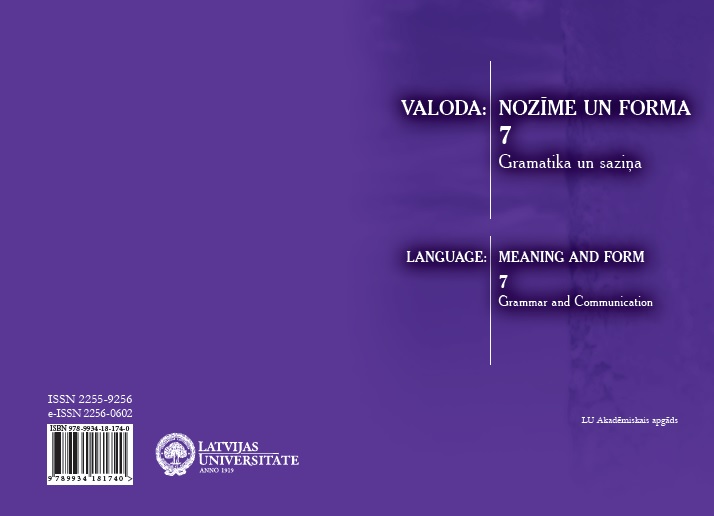Nenoteiksme, modalitāte un verba nullformas latviešu valodā
Infinitive, modality and zero forms of verb in Latvian
Author(s): Andra KalnačaSubject(s): Language and Literature Studies, Theoretical Linguistics, Applied Linguistics, Morphology, Syntax, Baltic Languages
Published by: Latvijas Universitātes Akadēmiskais apgāds
Keywords: nenoteiksme; modalitāte; izteiksme; nullforma; noliegums; elipse
Summary/Abstract: Infinitive as a verbal predicate is one of the means of expressing modality in Latvian. Infinitive expresses deontic or, rarely, epistemic modality. Besides the infinitive, modality in Latvian is expressed by different moods which play the main role. Different modal constructions with modal verbs (+ infinitive) and participles also are widely used in language. The present paper is devoted to the analysis of relations between the infinitive and modal constructions, and the modal meanings expressed by the infinitive and modal constructions. The crucial question of the analysis is – could any zero form of modal verb be possible in Latvian? It is connected with the interpretation of the (morpho)syntactic status of the infinitive in the function of predicate. If we agree that the infinitive is a simple verbal predicate than the answer is NO, and zero form of modal verb is impossible in Latvian. If, however, we think that the infinitive is a compound predicate than the answer is YES, because such predicate is similar to other nominal, verbal or adverbial compound predicates in Latvian where zero forms (mainly in the 3rd person, present) are widespread. However, polarity tests don’t approve the idea about zero forms of modal verbs in Latvian.
Journal: Valoda: nozīme un forma
- Issue Year: 2016
- Issue No: 7
- Page Range: 41-49
- Page Count: 9
- Language: Latvian

